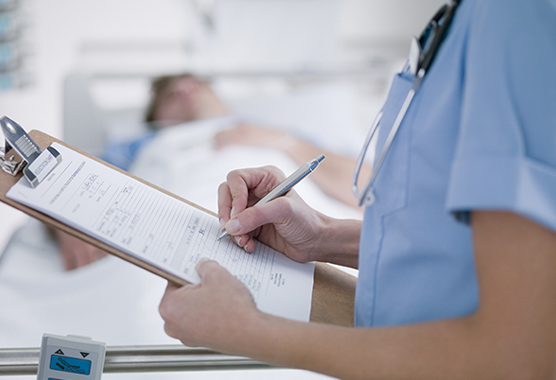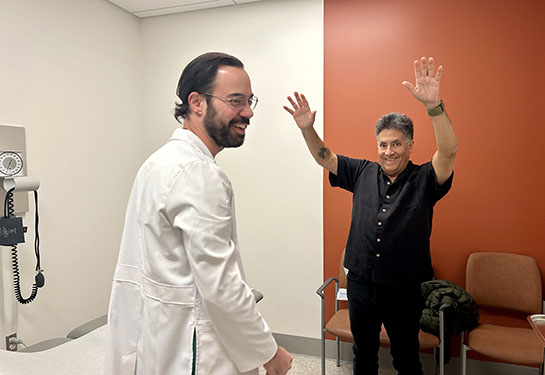Orthopaedic Complications
The orthopaedic specialists at UC Davis Health are committed to reducing complications from orthopaedic surgery, upholding the highest standards of care.
Medically reviewed by Mark Lee, M.D. on March 03, 2024.

Diagnosing and Treating Your Orthopaedic Conditions
At UC Davis Health Department of Orthopaedics, patient safety is our top priority. Your orthopaedic care team will discuss any possible complications with you and carefully monitor your recovery.
Types of Orthopaedic Complications
An orthopaedic complication is a medical problem that occurs during or after orthopaedic surgery. There is a risk of developing a complication any time you have surgery. Complications are rare and usually aren’t serious.
The most common orthopaedic complications include:
- Bleeding or bruising
- Blood clots, including deep vein thrombosis (DVT) and pulmonary embolism
- Delayed bone healing (delayed union/non-union)
- Dislocation of a joint implant
- Infection
- Nerve problems (sensitivity, numbness)
- Pneumonia
- Reaction to stitches
- Stiffness and swelling
- Wound healing problems
Symptoms of Complications from Orthopaedic Surgery
Pain and discomfort are expected after surgery. If your pain increases in the days following your procedure or you begin to experience new symptoms, contact your provider.
Common Symptoms
Symptoms of a possible orthopaedic complication include:
- Wound drainage that won’t stop
- Burning or stabbing pain that won’t go away
- Discharge of pus
- Fever
- Redness or warmth around the surgical site
- Swelling of the surgical site
Emergency Symptoms
Seek care immediately if you experience any of the following symptoms:
- Chest pain
- Coughing
- Difficulty breathing
- High heart rate
- Pain or swelling in the legs that is not part of the surgery site
Risk Factors for Orthopaedic Surgery Complications
Certain risk factors can make you more likely to develop a complication during or after your surgery.
These risk factors include:
Age
People older than 60 are more likely to develop complications like pneumonia or blood clots after surgery.
Diabetes
Poorly controlled diabetes can increase the risk of infection and delay wound healing following a surgical procedure.
High Blood Pressure
High blood pressure (hypertension) increases the risk of developing blood clots and infections.
Estrogen from Hormone Replacement Therapy (HRT) or Oral Contraceptives
The hormone estrogen in HRT and oral contraceptives has been linked to a greater risk of blood clots.
Obesity
Obesity has been shown to increase the risk of infection after surgery.
Smoking
Cigarette smoking can increase the risk of orthopaedic complications.
Diagnosing Orthopaedic Complications
Your provider will discuss your symptoms and do a medical exam. They may recommend one or more tests to see if you are experiencing a complication. These tests include:
- Imaging tests, including CT scan, MRI, or ultrasound, to look for an abscess or blood clots
- Wound swab and culture to see if a bacterial infection has occurred
- X-rays to determine delayed bone healing
Treatments for Orthopaedic Complications
Treatment will depend on the type of complication you are experiencing. Your provider may recommend:
Antibiotics
Antibiotics are medications that treat bacterial infections.
Blood Thinners
Medication to thin your blood can prevent blood clots from growing larger.
Compression Stockings
Compression stockings treat DVT by helping the blood circulate in your legs.
Surgery
Sometimes, it’s necessary to re-open your surgical site to treat an infection.
Preventing Orthopaedic Surgery Complications
It is possible to prevent or lower the risk of many orthopaedic complications. Your provider may recommend one or more of the following:
- Antibiotics to prevent and treat infection
- Blood thinning medications to prevent clots
- Breathing exercises to prevent pneumonia
- Compression stockings to improve leg circulation
- Walking to improve blood circulation
Healthy lifestyle habits can also help protect your health during and after surgery. These include:
- Maintaining a healthy weight
- Managing and treating health conditions like diabetes and high blood pressure
- Quitting smoking
Joint Replacement Risk
1%People who develop an infection after joint replacement surgery
Average Age
60Of people who undergo hip or knee replacement surgery
Request an Appointment
As Sacramento's No. 1 hospital, you'll benefit from unique advantages in primary care and specialty care. This includes prevention, diagnosis and treatment options from experts in 150 specialties.
Referring Physicians
To refer a patient, submit an electronic referral form or call.
800-4-UCDAVIS
Patients
Call to make an appointment.
Consumer Resource Center
800-2-UCDAVIS

Ranked among the nation’s best hospitals
A U.S. News & World Report best hospital in cardiology, heart & vascular surgery, diabetes & endocrinology, ENT, geriatrics, neurology & neurosurgery, and pulmonology & lung surgery.

Ranked among the nation’s best children’s hospitals
U.S. News & World Report ranked UC Davis Children’s Hospital among the best in pediatric nephrology, orthopedics*, and pulmonology & lung surgery. (*Together with Shriners Children’s Northern California)

Ranked Sacramento’s #1 hospital
Ranked Sacramento’s #1 hospital by U.S. News, and high-performing in aortic valve surgery, back surgery (spinal fusion), COPD, colon cancer surgery, diabetes, gynecological cancer surgery, heart arrhythmia, heart failure, kidney failure, leukemia, lymphoma & myeloma, lung cancer surgery, pacemaker implantation, pneumonia, prostate cancer surgery, stroke, TAVR, cancer, orthopedics, gastroenterology & GI surgery, and urology.

The nation’s highest nursing honor
UC Davis Medical Center has received Magnet® recognition, the nation’s highest honor for nursing excellence.

World-class cancer care
One of ~59 U.S. cancer centers designated “comprehensive” by the National Cancer Institute.

A leader in health care equality
For the 13th consecutive year, UC Davis Medical Center has been recognized as an LGBTQ+ Healthcare Equality Leader by the educational arm of America’s largest civil rights organization.

